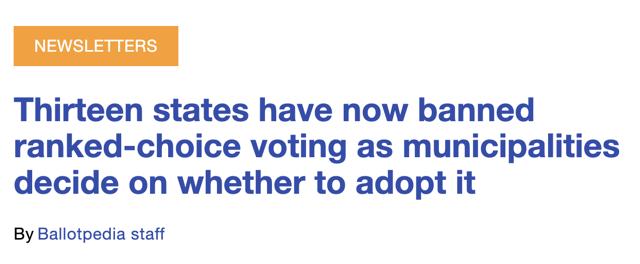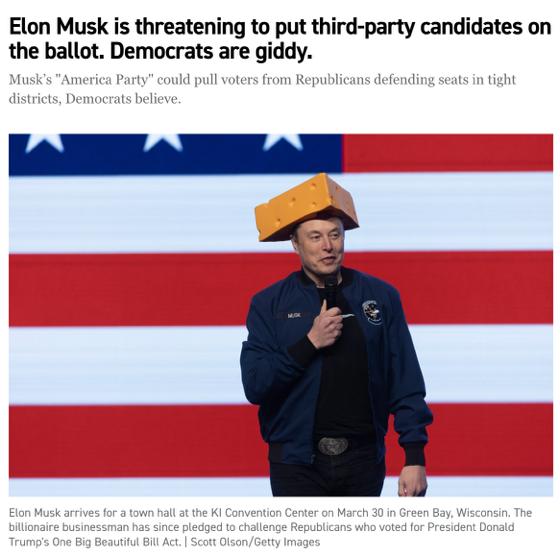

On July 26th, local time, Politico, an American media outlet, reported a development: Democratic officials have publicly stated that if Elon Musk’s new political party, the “America Party,” manages to secure seats in key swing states during the midterm elections, it could potentially divert Republican votes. This would benefit the Democrats, as Musk is more likely to attract voters dissatisfied with the Republican Party rather than those disappointed with the Democrats. The Democrats are “looking forward to this outcome.”
Previously, Musk announced the establishment of the “America Party” to challenge the current political landscape in the United States, which immediately sparked widespread attention and controversy. Musk’s move reflects a strong dissatisfaction with the existing election system and a call for reform within American society.
However, looking at the current situation, whether this attempt can shake up the American electoral political map remains heavily impeded.
According to a report by the American political news outlet Politico, Musk has promised to lead his party to breakthroughs in the midterm elections, which the Democrats see as a threat to the Republican Party.
The fatigue of partisan politics prompts a desire for change.
In recent years, the trust in both the Democratic and Republican parties among Americans has continuously declined. Polls show that over 60% of voters wish for a “third choice,” and about half of respondents believe that the existing election system cannot fully represent diverse public opinion.
To ensure fairer and more effective voting, calls for reform have gradually risen, including Ranked Choice Voting (RCV), which allows voters to rank candidates according to their preferences. If the first choice does not reach a majority, votes are automatically transferred to the second choice until one reaches a majority, thereby avoiding the waste of votes.
Another approach is the “National Popular Vote Interstate Compact” (NPVIC), which advocates for states to commit their electoral votes to the presidential candidate with the most popular vote nationwide, aiming to more closely align the final result with the true will of the electorate. Currently, some states and cities are piloting these new voting mechanisms.
Elon Musk’s “American Party” is a product of this societal sentiment. Leveraging his substantial financial resources, social media influence, and connections within the tech elite, he attempts to provide a new channel for political expression for voters dissatisfied with the two-party system.
According to Ballotpedia, an American non-profit online encyclopedia, 13 states currently explicitly oppose the adoption of “ranking-choice voting.”
However, reforming the United States’ electoral system has always been challenging due to complex political and legal obstacles.
Senate filibuster mechanism
This is a procedural rule that allows a minority of senators to delay debates by speaking for extended periods, effectively blocking legislation from moving to a vote stage. To end such lengthy debates, it requires a majority of 60 senators to vote in favor, ensuring that bills can be moved to a vote stage. This means that even if a bill receives over half of the votes (51 votes), it may remain in the “discussion” phase without ever being truly voted on if it fails to reach 60 votes. Due to the longstanding deadlock between the two parties, many election reform proposals have been shelved.
In other words, any adjustments to fundamental electoral mechanisms (such as abolishing the electoral college) require approval by both houses of Congress with a two-thirds majority vote and approval by three-quarters of state legislatures, which is nearly impossible to achieve in today’s highly polarized political environment.
Therefore, even with Musk investing massive funds and influencing public opinion, the third-party model he proposes is unlikely to shake the structural advantages of the two-party system or directly promote constitutional changes.
Whether “The Party of America” can break through traditional barriers remains uncertain.
Currently, aside from Tesla’s CFO Vaibhav Taneja, there are almost no heavyweight political figures officially joining “The Party of America,” and its organizational network is still in its initial stages of development. Even if Musk claims to be pushing candidates in certain key districts, whether it can actually break through traditional party blocs and secure seats remains an unknown. Most analysts believe that he is more likely to act as a disruptor of vote sources, affecting the results in local elections rather than becoming a new force in parliament.
However, this does not mean that Musk’s influence is weak. With his personal IP and technological capital, Musk undoubtedly has brought long-standing issues in two-party politics to the forefront, compelling the public and the political community to re-examine the fairness and representativeness of the election system.
△ Newsweek in the United States stated that Musk is trying to solve the fundamental cause of the American political dissonance: the corrupt two-party system.
From a societal psychological perspective, Musk’s actions reflect the growing dissatisfaction among Americans with the current system, stemming from both political polarization and imbalanced voting, as well as the fatigue in public policy under the deadlock between the two parties. Although “The Party of America” may struggle to win congressional seats in the short term and is even harder to directly promote institutional change, its emergence could become a new catalyst for discussion on election reform.
Future changes to the American electoral system will depend on broader social consensus, state-level reform experiences, and cross-party political compromise. Whether Musk can become a “breaker” on this long journey of reform remains a highly contested and uncertain question.